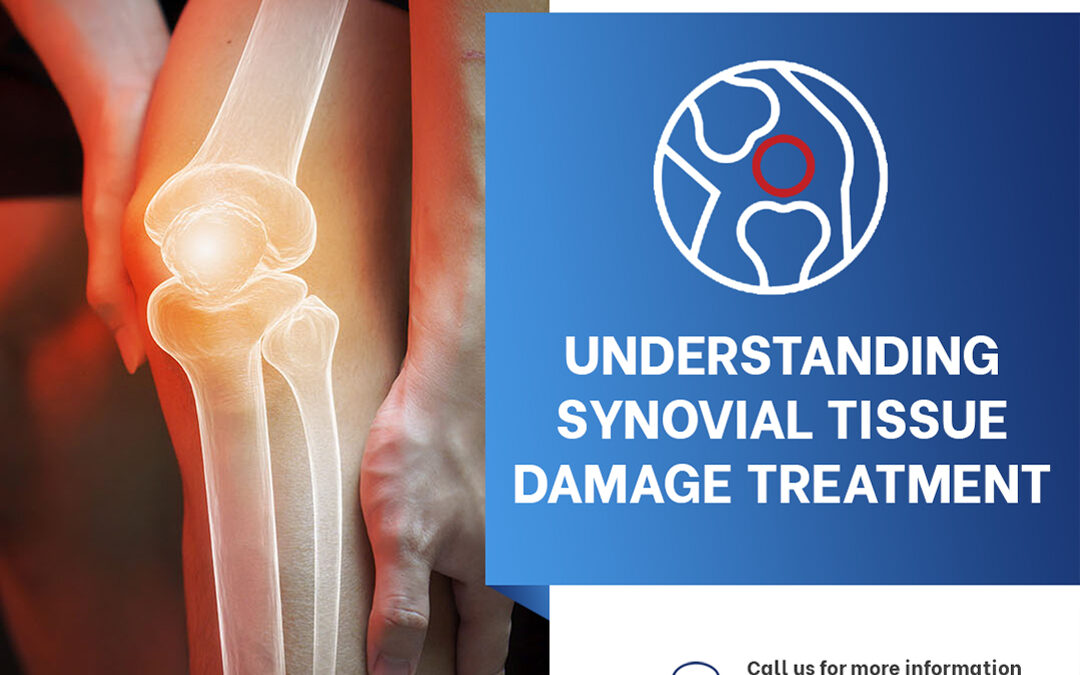Synovial tissue damage is caused by inflammation of the synovial layer in the joints. This key part of the musculoskeletal system enables smooth motion as we go throughout our daily activities. If synovial tissue damage occurs, it can lead to debilitating pain and other symptoms.
For example, synovial tissue damage is very common in the knee joint, causing knee pain and mobility problems that can negatively affect your life. By learning more about the causes of and treatment options for synovial tissue damage, you can take control of your pain and put yourself on the path to relief.
The caring professionals at Outpatient Joint Replacement Center of America are here to help. We welcome you to contact us at any time if you’d like to learn more or for answers to your questions.
What is Synovial Tissue?
Synovial tissue plays an important role in joint function. In the skeleton, joints are formed at the ends of major bone sections to enable movement and flexibility. To reduce friction and stress on the bones, the joints are coated with cartilage that is in turn protected by a layer called the synovial membrane that is made of synovial tissue.
Synovial tissue is thin connective tissue that surrounds joints and contains cells that emit viscous synovial fluid. Made up of protein and hyaluronic acid, synovial fluid acts as a lubricant while also delivering restorative nutrients to joint surfaces.
Why is Synovial Tissue Damage Common in the Knee Joint?
Many of the joints in the body, including the knee, ankle, foot, shoulder, elbow, wrist, and hands, are synovial joints. Potential causes of synovial joint damage include injury, daily wear and tear, and age-related degeneration. Lifestyle factors, such as obesity, smoking, and poor nutrition, can also contribute to synovial tissue damage and inflammation. In more rare cases, diseases such as cancer and autoimmune disease can also cause damage to the synovial membrane.
The knee joint is such a common location for synovial tissue damage because of the strain our knees endure on a daily basis. With each step, we put approximately four times the pressure of the body weight on each knee. This is compounded for people who participate in strenuous activity and high impact sports. Running increases this force to 7-8 times body weight.
Over time, this daily stress combined with the natural drying out and breakdown of cartilage and synovial tissue can lead to increased friction and joint inflammation.
In addition to the knee joint, synovial tissue damage can also commonly develop in other synovial joints, including the hip joint.
Synovial Tissue Damage Causes Knee Pain, Hip Pain and Other Symptoms
When it becomes symptomatic, synovial tissue damage and inflammation is widely associated with arthritis. This is because the combination of cartilage breakdown and synovial tissue damage makes joints more stiff and leads to increased bone on bone contact. The result is the following arthritis-related symptoms developing wherever joint inflammation is present, including:
- Knee pain
- Hip pain
- Stiffness and limited range of motion in the hip joint or knee joint
- A grinding and popping sensation, known as crepitus
Since synovial tissue damage is progressive in nature, diagnosing and treating the condition as early as possible offers the best chance of being able to achieve lasting relief.
Diagnosis and Treatment Options for Synovial Tissue Damage
Patients experiencing any of the above symptoms should see their doctor for a thorough physical examination and any necessary diagnostic testing. You should come prepared to answer questions about you and your family’s medical history as well as your specific symptoms and how they are affecting your lifestyle.
Synovial tissue damage related to arthritis will usually be treated with an initial course of conservative therapies that include:
- Getting rest as needed to reduce stress on the joint
- Balancing rest with activity to help promote strong supporting muscles and blood flow
- Managing symptoms with basic therapies such as hot/cold compression therapy and over-the-counter anti-inflammatory medication
- Working with a physical therapist to improve joint function and increase stability
- Receiving pain-relieving and anti-inflammatory injections to help reduce pain and inflammation in the joint and synovial tissue
Synovial tissue damage can also respond favorably to regenerative treatments designed to promote the natural healing process. Options include:
- Viscosupplementation, which involves injecting hyaluronic acid into the joint to improve function
- Platelet-rich plasma (PRP) injection therapy, derived from a patient’s own blood to deliver key nutrients to the joint
- Amniotic injections, an option for knee pain that contains growth factors to promote healing
Understanding Surgical Treatment Options
If synovial tissue damage associated with arthritis causes pain and significant joint damage that is not responding to conservative therapy, joint replacement surgery may become a serious consideration. The goal is to remove the damaged joint surfaces, including damaged synovial tissue, and replace them with implants that enable smooth motion without pain.
At OJRCA, we help patients by performing total knee joint replacement, which is recommended in cases of widespread joint and synovial tissue damage due to arthritis or injury. In other cases, a partial knee joint replacement can help if tissue and bone damage is present in a more limited part of the knee joint.
Patients experiencing pain and synovial tissue damage in the hip who have exhausted conservative therapies may total hip joint replacement.
Our experienced surgical team will provide a full evaluation and recommend the best course of treatment for you.
Reach out to OJRCA Today
To learn more about the wide range of treatment options we have for patients dealing with joint pain related to synovial tissue damage, contact OJRCA today. We want to help you find lasting relief and enjoy the healthy and active lifestyle you deserve.


